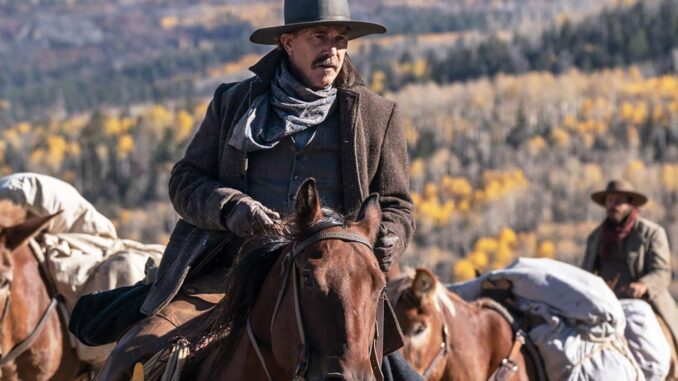
Kevin Costner is back in the saddle with Horizon: An American Saga Chapter 1, but does this ambitious project live up to its epic aspirations? As the first installment of a proposed four or five-part series, this film offers a lengthy journey through the post-Civil War American West—but at 181 minutes, it often feels like a long ride to nowhere. Let’s dig into what works, what doesn’t, and whether this film can truly hold its own in the beloved Western genre.
An Ambitious Undertaking: Costner’s Vision
Costner has dreamed of creating this expansive saga since the late 1980s. With no major studio willing to finance such an ambitious project, he took matters into his own hands, reportedly pouring a staggering $58 million of his own money into the film. This kind of commitment is commendable, and it’s clear that Costner is passionate about telling stories rooted in America’s history.
But passion alone doesn’t guarantee success, and Horizon often feels more like a collection of well-meaning scenes than a coherent narrative. While Costner has proven himself a capable filmmaker with works like Dances with Wolves, this film struggles to find its footing amid a sprawling cast and multiple subplots.
Plot Overview: A Meandering Journey
Set in 1859, Horizon follows settlers surveying land in the San Pedro Valley while they remain blissfully unaware of the Apaches observing them. The story quickly turns violent when a woman named Lucy (Jena Malone) bursts into a settlement, leading to a brutal Apache raid. This early action sequence is one of the film’s standout moments, delivering the visceral excitement fans of the Western genre crave.
However, after this initial burst of adrenaline, the film takes a leisurely pace that can feel almost ritualistic. Characters come and go, with many barely fleshed out before the story shifts focus again. The narrative feels disjointed, and viewers may struggle to keep track of who’s who as the film jumps from one subplot to another.
The Characters: Familiar Faces in an Unfamiliar Land
Costner plays Hayes Ellison, a stoic figure reminiscent of classic cowboy archetypes. While he brings a certain gravitas to the role, his character’s depth often feels overshadowed by the film’s pacing issues. In a film designed to explore various perspectives, it’s a missed opportunity that Hayes remains largely silent and enigmatic.
Other characters include:
- Sam Worthington as Lieutenant Trent Gephardt: A conflicted officer questioning the morality of encroaching on indigenous lands.
- Sienna Miller as Frances: A frontierswoman who finds herself in a romantic subplot that barely gets off the ground.
- Abbey Lee as a courtesan: Her brief interactions with Costner’s character serve more to embellish the setting than to add real depth to the story.
The film attempts to showcase a range of viewpoints, including that of the indigenous characters. However, despite the inclusion of indigenous actors, the overall approach still feels lacking, leaning more toward a traditional Western narrative than a revisionist take.
Visuals and Music: A Feast for the Eyes and Ears
One of the undeniable strengths of Horizon is its visual presentation. Costner and his team capture the sweeping landscapes of the American West beautifully, using the natural environment to evoke a sense of grandeur. The cinematography often harkens back to classic Westerns, with dusty plains and rugged mountains providing the perfect backdrop for the unfolding drama.
John Debney’s musical score enhances the film’s emotional weight, creating a sweeping soundscape that complements the stunning visuals. It’s a shame that such artistry is wrapped around a narrative that doesn’t fully deliver.
The Pacing Problem: A Long Wait for Resolution
At nearly three hours long, Horizon tests the limits of viewers’ patience. While epic films can be successful when they allow audiences to immerse themselves in rich storytelling, this film often meanders without significant payoff. Many plotlines remain unresolved by the end, leaving viewers feeling as if they’ve been on a long, unfulfilling ride.
The abrupt conclusion, with its montage of gunfights and chases from the next installment, feels more like a teaser than a satisfying ending. Audiences may find themselves frustrated, having invested time in a story that offers little in terms of closure or character development.
A Journey Worth Taking?
So, is Horizon: An American Saga Chapter 1 worth the long haul? For die-hard fans of the Western genre and those who appreciate Costner’s earlier works, there may be enough here to warrant a watch. The film has its moments of intense action and visual splendor, but the lack of a cohesive narrative may deter more casual viewers.
Ultimately, Horizon presents a curious blend of homage to classic Westerns while struggling to carve out its own identity. As Costner continues his ambitious quest to expand this saga, one can only hope that future installments will find a stronger narrative backbone and deliver the emotional depth that’s so often lacking in this first chapter.
Conclusion: Looking Ahead
With Horizon: An American Saga Chapter 1, Kevin Costner sets the stage for an epic tale that remains largely unresolved. While the film has its strengths, it ultimately feels like a long, winding road with no clear destination in sight. As we await the next chapters in this ambitious saga, it’s clear that Costner’s vision, while grand, may require more polish to truly resonate with audiences.
